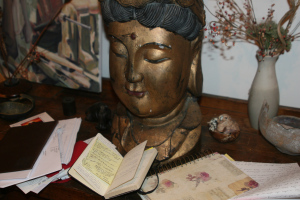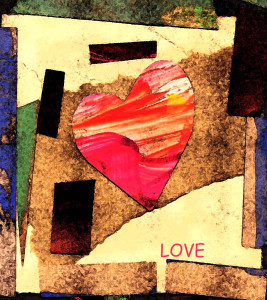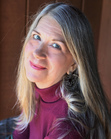Ann E. Michael's Blog, page 54
January 24, 2016
Parody (& tribute)
I live in the Northeastern USA. We had a bit of snow.
Here’s my contribution to the storm literature:
So much depends
upon
a red wheel
barrow
filled with white
snow
beside the rope
swing
~
Apologies to William Carlos Williams, yet again. :)


January 18, 2016
Renewal, work
One never can know when work will arrive. By the term work, I mean what some people call “inspiration” but which, for me, is more work than it is a shower of divine gifts from the Muse. The past week brought an uptick in poetry drafts, as well as the acceptance of a poem by a publication I admire. All the more reason, therefore, to continue the process of working on the composition of creative writing.
I wonder if there’s an urgency pushing me to write new poems–the semester begins this week, and once I am teaching and tutoring again, time to write seems to evaporate–so I had better get cracking! Or it could be my response to the losses about which I have recently written, supposing that there is merit to the practice of writing as a way of healing or the writing cure (and I do suppose there is merit).
Maybe, just maybe, one might presuppose a connection with the arrival of a new year. Renewal. That would be arbitrary and perhaps subconscious; but the possibility remains. I can consider myself in the not-quite-midwinter renewal period, wrestling with potential poems that might turn out to be essays or blog posts or total duds or, if I am diligent and analytical and compassionate and lucky, completed poems.
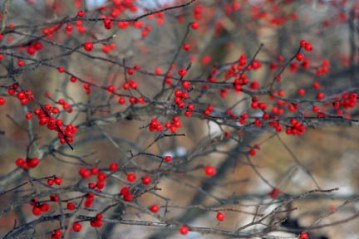
Winter arrives…in red & white
~
Wish me luck. And hard work. I don’t mind being urged toward hard work; it’s the only way renewal really ever happens.


January 9, 2016
In memoriam
Ariel Dawson, 1959-2013
I recently learned that a friend who was hugely significant in my life once, but with whom I had lost touch for 15 years, no longer walks the same earth that I do; in fact, Ariel Dawson died in 2013, unbeknownst to me.
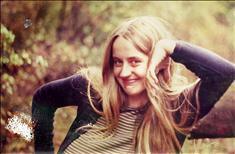
Ariel Verlaine Dawson
It is hard to lose friends, but losing the friends of one’s youth–those intense, passionate friendships that teach human beings how to navigate the world of human relationships–that loss cuts in a different way. For Ariel is perhaps the reason I am a writer. No–I would have become a writer. She is the reason I decided it was possible to be a poet. She amazed me with her vocabulary, her insights, her evaluative reading, her positively voracious and precocious reading, her charm, her forthrightness, her neurosis; she seemed to fear nothing (but that wasn’t true); she had published poetry in real journals before she was 17 years old; she read Rilke and Yeats; had affairs with well-known poets; spent years fathoming Jung. In 1994, she wrote an opinion piece for what is now AWP’s Writer’s Chronicle responding indignantly to Dana Gioia’s article “Can Poetry Matter?”–a piece that started quite a dust-up among defenders of what has been termed “new formalism.”
Ariel had always been the sort of person who chose to disappear and then to reappear, to my joy, months or years later to take up the friendship without pause–and often without explanation for her absence. She had her reasons, and I respected that; but I missed her.
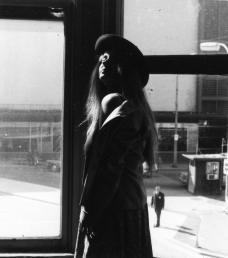
Ariel, 1977 or 78
~
In the early 1980s, my (also late) friend David Dunn and I were publishing chapbooks under the small-press name LiMbo bar&grill Books. We approached Ariel for our second-ever chapbook: Poems for the Kazan Astrologer. She was, at the time, teaching creative writing at Old Dominion University. We were very happy with the outcome, but we had no good method of distributing the books. I may still have a box of 25 or so of these books somewhere in my attic.
Then Ariel became more intensely interested in Jungian psychology, though it had long been a passion of hers.
In subsequent years, she wrote less and less poetry and stopped submitting her work for publication. The response to her Writer’s Chronicle opinion was, I think, a bit shocking to her, though I know she stood by her opinion. She just decided, perhaps, that she felt more at home in the world of Jung and his followers.
During the past decade I have often tried tracking her down, imagining the internet would find her. My job at the college has made me a rather adept online researcher, but all that ever showed up was a listing for her psychotherapy practice in New York City. The number was incorrect.
Then, my father became very ill and other issues crowded my mind. Searching for a friend who clearly wanted to remain anonymous in an electronic era was not a priority.
Besides, I always assumed that Ariel would suddenly re-emerge, call me–my phone number remains the same as it was last time I saw her–and mention she was going to be in the area, and could she stop by? That’s how it had been before. And I’d be thrilled to see her, and we’d talk about poetry and art, and politics and pets, cheese, philosophy, psychology, parents, wine…
I assumed incorrectly. That’s what happens with assumptions. Just this past week, when I finally found myself with some spare time, I tried an internet search again. And found her “electronic obit” online, and the fact that she’d died in February of 2013.
~
I have no words to express how this information feels to me.
And also–
~
Arthur Cadieux, 1943-2015
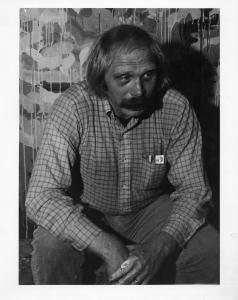
Arthur Cadieux in 1978, a photo taken by Jim Terkeurst.
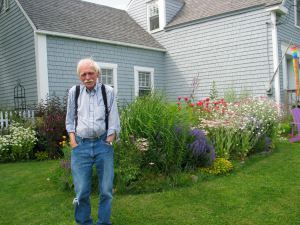
Arthur 2011, Eastport, Main
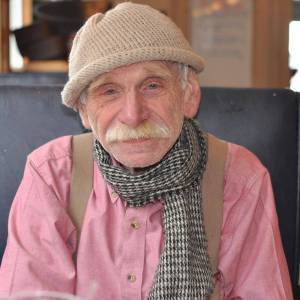
Arthur in 2015. Photo Elizabeth Ostrander.
~
Arthur Cadieux was my art teacher at Thomas Jefferson College in the late 1970s. He and his wife, Helene, were exceptionally kind to young adults who had an interest in art and in observing the world around them. We had dinner at their house in Michigan and at their loft apartment in New York City. Years later, after Helene’s tragically early death, and after Arthur had moved back to Maine, he let me stay at their cottage on Leighton Point (he lived in a smaller house in town) so that I could have a personal “writing retreat.” He deeply understood the creative person’s need for reflection, evaluation, thought, imagination, boredom, and occasional moments of lively talk. The universe needs people like Arthur Cadieux, talented and generous, who are constantly pushing their own boundaries. Many of us who benefited from his friendship will miss him. Arthur’s paintings can be found at his website, arthurcadieux.org.
~
May they be free from suffering and causes of suffering.
May they never be separated from the happiness that is free from suffering.


January 4, 2016
Epiphany
This week includes the date of the Epiphany, January 6th, the close of the Christmas celebration. Christian tradition confers religious importance to the day because it commemorates the visitation of the magi, the “Wise Men” or “Three Kings,” to the infant Jesus; more metaphorically, the Epiphany hallows “the manifestation of Christ to the Gentiles as represented by the Magi (Matthew 2:1–12),” as Google’s dictionary puts it.
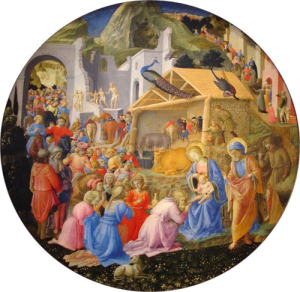 Google’s dictionary offers a little graph at the close of its definition, if the reader scrolls down far enough. The use of the word epiphany has risen considerably from the 1800s; I suspect the reason for that is that the term has migrated toward its other meaning as a revelation, particularly a creative revelation: “a moment of insight.”
Google’s dictionary offers a little graph at the close of its definition, if the reader scrolls down far enough. The use of the word epiphany has risen considerably from the 1800s; I suspect the reason for that is that the term has migrated toward its other meaning as a revelation, particularly a creative revelation: “a moment of insight.”
Epiphany is a word encountered when reading about artists, inventors, philosophers, writers. It has become something to treasure–the AHA! moment, the reveal, the serendipitous appearance of a solution or concept–which is a meaning closely derived from its etymology: epiphainein, ancient Greek for “reveal.” The challenge for the artist or writer is to make manifest that revelation, if one is lucky enough to encounter it. The true epiphany must be acted upon, or lost.
~
And, of course, the other challenge is to continue to write day by day by day, when revelations seem few and far between or totally unforthcoming. That is a different order of activity, one which I’m currently engaged in, without epiphanies to help me along. Wish me luck.


January 1, 2016
Writing the new year
To renew myself as a writer of poetry, I need–every now and then–some way of re-engaging with the work of writing itself. Revision, for example, often means hard effort slogging through material I wrote long ago; but the process renews my dedication to the salvageable poems and sharpens my analytical and evaluative skills.
Sometimes there’s no saving a poem, but the concept behind it might be worth exploring in an essay.
Sometimes there’s no saving a poem, but the words needed to be expressed at that time.
Revision requires taking a stance of compassionate distance from the work itself so that I can feel both judgment and kindness toward my own poems. The bonus here is that, often, the work of revision gets me writing new work.
Beside my desk at this moment is a stack of poems I spent the past few days thinking about and revising. The work creates its own energy; the buzz of words and imagery emanates…
I feel ready to write the new year.
:)


December 26, 2015
To endure
I have been contemplating the word endure, particularly in relation to my continuing curiosity about consciousness and in relation to physical enduring when the body is in pain.
Reading an excerpt from Husserl (the first proponent of transcendental phenomenology) that–admittedly, taken out of context–places consciousness in relation to time, I realize endure implies the concept of time itself even though time doesn’t make an appearance in its etymology (see below). Husserl writes:
Every temporal object has a duration…but in the type that is duration we have a distinction between the expanding, flowing duration and the momentary durations.
He suggests that there are “filling-in” types of duration, or time-phases, that arise to create “a continuous consciousness of unity whose correlate is an unbroken unity,” giving us the impression of sensuous unity in time. I wonder if our sensations of physical pain operate in the synapses of the brain in somewhat the same way: momentary (acute), and filling in over time or flowing (chronic).
When we suffer, we call upon endurance to sustain ourselves. The verb form connotes the negative more commonly, such as to endure oppression, abuse, harassment, pain, humiliation. It is an active verb.
etymology: late 14c., “to undergo or suffer” (especially without breaking); also “to continue in existence,” from Old French endurer (12c.) “make hard, harden; bear, tolerate; keep up, maintain,” from Latin indurare “make hard,” in Late Latin “harden (the heart) against,” from in- (see in- (2)) + durare “to harden,” from durus “hard,” from PIE *dru-ro-, from root *deru- “be firm, solid, steadfast”
Nonetheless, strength is also implied, a resilient firmness that people tend to value. What is the current perspective on being steadfast? Is it to harden (become stubborn and inflexible) or to be solid? Don’t we admire the person who has endured much and yet, one way or another, lived life as it presented itself however hard the circumstances? And are those positive or negative traits, as our culture views them? Customs endure. Prejudices endure. When we call someone a “hard person,” it is seldom a compliment. Yet being steadfast is generally considered a virtue.
It’s interesting to note that the adjective form of endure has a more positive connotation–
“lasting,” 1530s, present participle adjective from endure.
An enduring work of art; an enduring love. Something that defies time by lasting through those temporary durations and through the fillings-in. We human beings wonder whether our consciousness, what many have called our souls, are enduring in the sense of expanding over time and past the demise of our corporeal selves. But great literature, great music, great art suggests there are many ways to endure.
In the New Year, my hope is to become attentive to what endures; to extend compassion and love more widely and more deeply; to read good books and take in good works of art; to be good at what I do reasonably well, tending to myself and to others with as much grace as I can muster. Some years challenge us more than other years. Let us choose to endure.


December 20, 2015
Responses
The semester is over, and the juncos have returned to my back yard. One thing I have trouble assessing after teaching my class is whether the students have made any inroads into learning the difference between a fact and an opinion, and argument and a disagreement, an interpretation and an analysis. But a response can be any of these things.
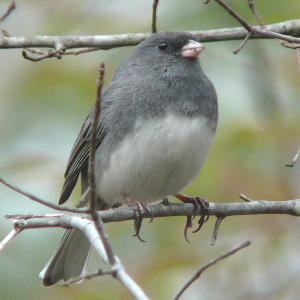
Thanks to wikimedia.org/wikipedia/commons
Recently I have been entertained by Rebecca Solnit’s responses (as opinion). She’s made a bit of an earnest-minded internet buzz with her brief essay concerning Esquire magazine’s “80 Books All Men Should Read.” [As an aside, I really enjoyed her early book Wanderlust: A History of Walking.] Her opinion piece on Lithub is smart and funny, and she irked many readers; yet I do not see how anyone can argue with her final paragraph:
…that list would have you learn about women from James M. Cain and Philip Roth, who just aren’t the experts you should go to, not when the great oeuvres of Doris Lessing and Louise Erdrich and Elena Ferrante exist. I look over at my hero shelf and see Philip Levine, Rainer Maria Rilke, Virginia Woolf, Shunryu Suzuki, Adrienne Rich, Pablo Neruda, Subcomandante Marcos, Eduardo Galeano, Li Young Lee, Gary Snyder, James Baldwin, Annie Dillard, Barry Lopez. These books are, if they are instructions at all, instructions in extending our identities out into the world, human and nonhuman, in imagination as a great act of empathy that lifts you out of yourself, not locks you down into your gender.
Roth, Caine, Miller– “just aren’t the experts you should go to” if you want to understand half the human species; I love that tongue in cheek understatement. I also love her list of “heroes,” although it doesn’t hurt that she names among them many of my own heroes. She says she reads and re-reads work that she has opinions about–and admits her opinions may not align with the generally-accepted opinions. Which is fine, since she reminds us, quoting Arthur Danto, art can be dangerous, risky, uncomfortable, as long as it means something.
She does raise the point that “[y]ou read enough books in which people like you are disposable, or are dirt, or are silent, absent, or worthless, and it makes an impact on you. Because art makes the world, because it matters, because it makes us. Or breaks us.” In this way, she reminds us that readers are people who may have perspectives that vary from one another, particularly as to the social, psychological, or artistic merit of a piece of literature. Lolita, for example. That’s one book she mentions that evoked considerable response from Lithub commenters.
Rebecca Solnit’s response to her detractors–or “volunteer instructors,” as she calls them at one point–and her willingness to walk around the Himalayas with a medical team (recounted in a recent New Yorker piece) count as reasons her work has moved to the top of my to-read pile of books. I think I will start with Men Explain Things to Me and A Field Guide to Getting Lost.


December 13, 2015
Resilience & interpretation
I know many of the readers who follow this blog are not citizens of the United States. Perhaps you have been hearing about the contenders for our upcoming presidential election and feeling some dismay. Perhaps you are particularly concerned about calls for identifying citizens based upon their ethnic background and religious choice.
If so, I assure you that there is push-back here from people who recognize that persons such as Mr. Trump embarrass the nation. It appalls us to see a person who feels he can ignore the U.S. Constitution running for the presidential office simply because he has money and recognition…although the free and open laws of the country permit him to proceed.
Trump’s proposal to identify some of our citizens by creed or heritage violates the Constitution in several ways. It violates Amendment One’s provisions for freedom of religious expression, and Amendment Four, the right to privacy; and the section of Amendment Five that relates to being held answerable to a crime and deprived of liberties without due process of law; also, Amendment Fourteen Section 1. Many, many U.S. citizens know that such proposals are merely rabble-rousing slander and could not be enacted without completely controverting the Constitution. These people are not wealthy entertainers, and they do not make the news, but they exist and–with any luck–they will vote.
A person running for the highest office in his country should know its laws thoroughly, but nothing in our Constitution says he (or she) must. We citizens are to blame, as clearly many of us are not terribly familiar with the laws of the United States of America, either. U.S. citizens should become more aware of our responsibility to learn about the Constitution, the importance of the vote, and the need to be rational thinkers when we go to the polls. Our democracy’s founding documents were drafted by people who earnestly, if perhaps idealistically, believed that human beings are capable of rational decision-making.
Granted, they also thought they were granting voting rights to property-owning men. The Constitution has been altered over time; it is a resilient, flexible, and enduring piece of prose that’s been the source of frequent interpretation.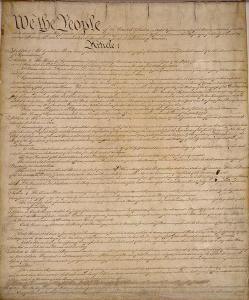 From a literary standpoint, resilience and interpretation are what keep “classics” alive and relevant as works of art, though close readers can also use context, history, and speculation about original intent to examine a piece of writing they love and respect.
From a literary standpoint, resilience and interpretation are what keep “classics” alive and relevant as works of art, though close readers can also use context, history, and speculation about original intent to examine a piece of writing they love and respect.
I have no idea of how I will vote next November. But I do know I will consider, more than personal values, the values of the nation under whose laws I currently reside. I’m reminded of the wisdom-teachings of Jesus in the Gospel of Matthew–
He said to them, “Then render to Caesar the things that are Caesar’s; and to God the things that are God’s.” Matt. 22:21
The people listening to Jesus went away “amazed” (Matt. 22:22). There is something ambiguous in that response that speaks to me today, something worth meditating upon, something worth interpreting.
~


December 6, 2015
Fear & peace
Human beings have a problem with fear.
I guess it is evolutionary, as well as anthropological, cultural, social…all those tribal basics, banding together to protect ourselves from anything that threatens, anything that is not us. From this perspective, how likely is it that we will ever learn compassion or know peace?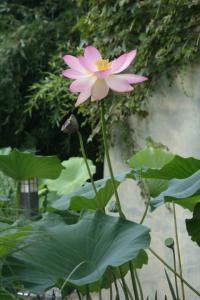
There is a practice among Buddhists called tonglen, a form of meditation to engage in compassion that is not just deep but also wide, spreading to “all sentient beings.” I’ve written a bit about it here, as well. In the past year, I have had personal and social concerns that urge me to confront fear in a loving and accepting manner; otherwise, I think I would despair.
The world offers comfort to its compassionate observers. Sorrow and pain are part of life, but they are not the sum of life; fear shuts us off from curious and open-minded observation.
We may never know peace–not in terms of a constant, steady-state peacefulness; evolution doesn’t operate that way. Physics doesn’t operate that way. Change can be painful, but it is necessary and beautiful in its many unfolding ways. I wonder if it isn’t peace we should be seeking but freedom from a close-minded, intellectual sort of fear.
I am posting this poem (from my book Small Things Rise & Go, available from FootHills Publishing). Readers respond to this piece, I’ve found, in startlingly different ways. It is, among other things, a meditation.
~
Liturgy
We will not know peace.
Hay clogs the thresher,
Snow stoppers thruways.
Starlings haggle out the morning.
Red fox probes her muzzle
Into the voles’ weed bunkers;
Harrier screams over moors.
We will not know peace.
Here, the caterpillar
Tires chew fields into slog;
Here a child’s toy erupts
Into a village of amputees.
Sands shift under an abstraction,
The sea grows warm.
We will not know peace,
During our lifetimes, the tines
Break, the cogs slip,
Polluted slough impedes
Our efforts at contentment.
Our own natures
Bully us down: Peace—
Peace to those who do not know peace.
To the fieldhand knee-deep in grain.
To the broken doll clasped by a broken child.
To the small-time fisherman far at sea.
To my mother with war scrawled through her
To the empty church, the hill of snow, evening—
That may never know peace.
~
© 2002, 2006 Ann E. Michael


November 29, 2015
Poem for my dad
If you have been reading this blog for the past year, you may recall my posts concerning the 50th year celebration of the March on Montgomery and the Voting Rights Act. (Click on the links below if you want to read them). I mentioned in the first post that I was trying to write a poem about my father’s memories of the event.
January 14: Trying to write (Selma)
January 18: Guest blogger–My dad’s memoir
After much struggle and revision (and many thanks to my writing critique group), I did manage to write that poem.
And: the poem has been published! Here it is, in One – volume 7. Richard Krawiec of Jacar Press has placed the poems, one by each poet (hence the journal name) so that the readers can scroll one by one, taking their time through the pieces. There’s a feel of development in this form of editing. It reminds me a little of how a good record album–if you recall those days–worked song by song to create an album experience that differed from just hearing the tunes randomly. The result was not always thematic, but a sense of mood or tone arose. I guess it’s similar to what poetry reviewers call the “arc” of a book of poetry. An arc is not necessary, but sometimes a feeling of synthesis does enhance the poems.
“Arc” is particularly apt here, given the title of my poem–taken from Rev. Dr. Martin Luther King, Jr.’s famous speech on that day.
“Arc of the Moral Universe, Bending toward Justice”
~
Thanks for reading.




